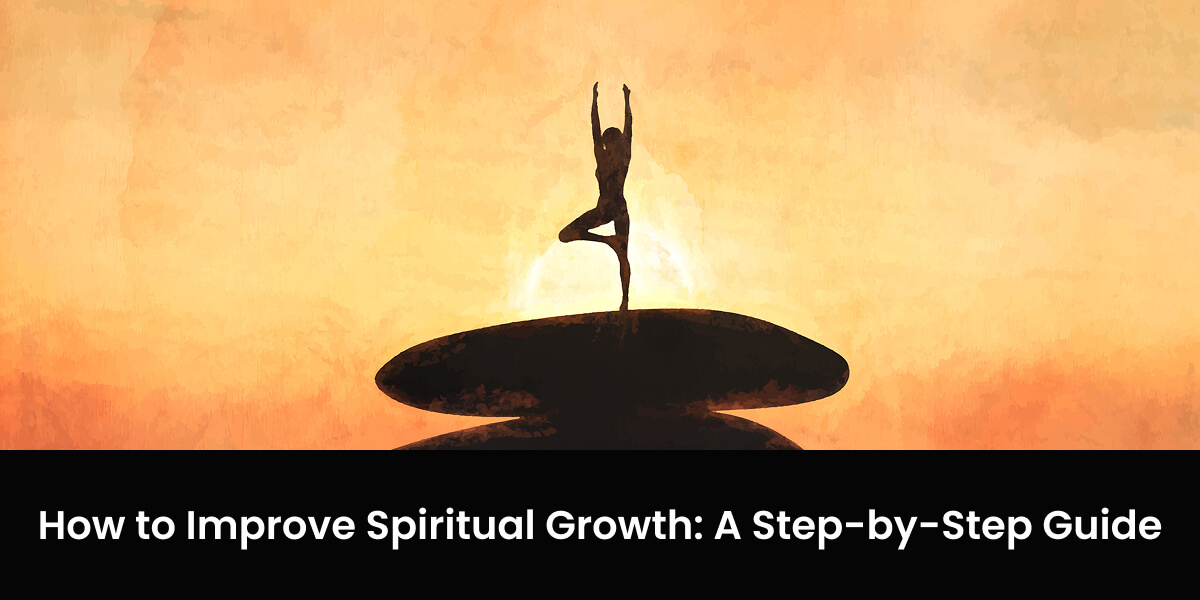Spiritual progress is an individual journey toward better self-awareness, deeper purpose, and a more significant relation to existence. It’s not about following an accurate set of rules or adopting the belief system—it’s about extending your central growth, evolving impassioned balance, and living more consciously.
Many societies inquire about religious tumors when they feel fastened, disconnected, or bizarre about entities further the material globe. It can cause a sense of peace, management, and elasticity, even all along disputing occasions. The good news? Anyone can cultivate religious progress accompanying goal and regularity.
In this step-by-step guide, you’ll gain proficient habits to encourage your religious path—no matter where you’re offset from. Whether you’re investigating care, expanding conviction, or simply probing for clearness, these steps can help you resume accompanying your topmost self.
What Is Spiritual Growth?
Spiritual growth is the continuous process of flattering more harmonious accompanying your personality and the deeper aspects of history. It includes expanding knowledge, tenderness, wisdom, and a sense of links to entities better—either that outer space, nature, a divine nature, or your own central authenticity.
Unlike material or intellectual progress, religious growth is private. It asks you to pause, indicate, and develop in by virtue of what you contemplate, feel, and live. It’s not about escaping growth’s troubles, but about knowledge to face the ruling class accompanying greater self-assurance, understanding, and harmony.
Ultimately, otherworldly progress helps you live more really. It boosts you to align your conduct accompanying your principles, treat the remainder of something accompanying empathy, and move through history accompanying a sense of purpose that goes further the surface. It’s an intensely private journey—but one that can transfer by what method you know entirely.
Why Focus on Spiritual Growth?
Focusing on spiritual growth can transform the way you live, think, and relate to the world. It helps you build a deeper understanding of yourself and provides a strong inner foundation to navigate life’s challenges with more clarity, peace, and resilience.
Whether you’re seeking personal healing, purpose, or simply a more meaningful way of living, spiritual growth offers benefits that extend far beyond just the inner self.
Here are some key reasons to focus on spiritual growth:
- Deepens self-awareness – Helps you understand your thoughts, emotions, and patterns more clearly.
- Promotes inner peace – Reduces anxiety and stress by cultivating calm and mindfulness.
- Strengthens resilience – Builds the emotional and spiritual tools to cope with life’s ups and downs.
- Guides purposeful living – Aligns your actions with your core values and inner truth.
- Improves relationships – Fosters empathy, compassion, and authentic connection with others.
- Encourages mindful decision-making – Helps you make choices from a place of wisdom, not impulse.
- Enhances gratitude and contentment – Shifts focus from external wants to inner abundance.
- Increases connection to something greater – Whether it’s nature, the universe, or a higher power, it brings a sense of belonging and meaning.
How to Improve Spiritual Growth?
Improving your spiritual growth isn’t about quick fixes—it’s about creating habits and mindsets that invite depth, awareness, and inner transformation. The process is personal and gradual, but when approached with intention, it can lead to lasting shifts in how you experience yourself and the world.
Here are key steps to help you cultivate and strengthen your spiritual growth:
1. Start with Self-Reflection
Begin by asking meaningful questions about your life, values, and beliefs. Self-reflection is the foundation of spiritual growth because it brings unconscious thoughts and patterns into awareness. When you better understand your inner world, you can live more consciously and purposefully.
Keep a journal, pause during your day to observe your thoughts, or reflect after challenging situations. Over time, this practice can reveal what truly matters to you and what needs healing or alignment.
2. Practice Mindfulness and Presence
Mindfulness teaches you to fully experience each moment without judgment. It helps you notice your thoughts and emotions without getting lost in them. This awareness strengthens your connection to the present and reduces stress, making space for spiritual clarity.
You can start small—try mindful breathing, eating, or walking. As your awareness grows, so does your ability to respond to life from a calm, centered place rather than reacting impulsively.
3. Meditate Regularly
Meditation is a powerful tool for inner stillness and spiritual insight. It helps quiet the mind, deepen concentration, and connect with your higher self or inner wisdom. Regular practice nurtures peace and a sense of grounding that supports spiritual growth.
Start with just 5–10 minutes a day. Use guided meditations, focus on your breath, or silently repeat a mantra. The key is consistency, not perfection.
4. Connect with Nature
Nature is a natural healer and spiritual teacher. Spending time outdoors reconnects you with life’s rhythms and encourages awe, humility, and gratitude. It can also reduce anxiety and enhance your sense of being part of something larger than yourself.
Take walks in a park, sit under a tree, or simply observe the sky. Even brief moments of quiet time in nature can reset your energy and perspective.
5. Read or Listen to Spiritual Teachings
Learning from spiritual books, podcasts, or teachers can offer new insights and guidance. These resources can challenge you, comfort you, and inspire growth. They can also provide frameworks or language for your own experiences and feelings.
Choose content that resonates with your values—whether it’s rooted in a spiritual tradition or focuses on universal wisdom. Take notes, reflect, and apply what feels meaningful.
6. Practice Gratitude Daily
Gratitude shifts your focus from lack to abundance. It trains your mind to recognize the good, even in difficult circumstances. This simple shift can elevate your mood and deepen your spiritual connection to life.
Try listing three things you’re grateful for each day, either in writing or mentally before bed. With practice, gratitude becomes a lens through which you see life more clearly and kindly.
7. Surround Yourself with Uplifting Energy
The people and environments around you influence your energy and mindset. Seek out those who support your growth, inspire reflection, and encourage authentic living. Being around conscious, kind, and intentional people can accelerate your spiritual journey.
This might mean joining a spiritual group, attending workshops, or simply setting boundaries with those who drain your energy. Protecting your peace is a spiritual act in itself.
8. Serve Others with Compassion
Serving others cultivates humility, empathy, and a sense of purpose. When you give from the heart—whether through listening, volunteering, or small acts of kindness—you tap into the deeper connection we all share.
Look for ways to help in your daily life. It doesn’t need to be grand—being fully present with someone or offering sincere encouragement can be deeply impactful.
How to Know You’re Growing Spiritually?
Spiritual growth isn’t always dramatic or obvious. Often, the signs are subtle and gradual, revealing themselves through shifts in mindset, emotions, and behavior. Recognizing these changes can reassure you that you’re moving in the right direction—even when progress feels slow or uncertain.
Here are some common signs that indicate you’re growing spiritually:
1. You respond rather than react.
You take time to process emotions and situations, choosing thoughtful responses instead of impulsive reactions.
2. You seek meaning over materialism.
Your focus shifts from chasing possessions or status to finding purpose, fulfillment, and inner peace.
3. You embrace stillness and solitude.
You find comfort in quiet moments and enjoy your own company without constant external stimulation.
4. You feel more connected to others and life.
There’s a growing sense of compassion, empathy, and unity—even with people or experiences you once resisted.
5. You notice inner peace despite external chaos.
Life still has challenges, but you’re less shaken by them and more grounded in your inner calm.
6. You’re more self-aware and reflective.
You regularly question your thoughts, behaviors, and patterns and seek growth from within.
7. You forgive more easily.
Letting go of resentment or anger becomes more natural as you prioritize healing over holding grudges.
8. You are drawn to authenticity.
You seek honest relationships, express yourself truthfully, and feel less need to please others.
9. You practice gratitude naturally.
You begin to notice and appreciate small blessings in your daily life, even during difficult times.
10. You feel guided by intuition.
Your inner voice becomes clearer, and you learn to trust your gut when making decisions.
Common Challenges in Spiritual Growth
Spiritual growth, while rewarding, is not without its obstacles. The journey often brings discomfort, uncertainty, and growing pains as you shed old patterns and embrace new awareness. These challenges are natural and often necessary—they test your commitment and deepen your insight.
Recognizing these common hurdles can help you navigate them with more compassion and patience:
1. Feeling lost or disconnected
It’s common to experience confusion or emptiness when your old beliefs no longer fit, but new ones haven’t fully formed yet.
2. Doubting your progress
Spiritual growth is subtle, and you may question if you’re growing at all, especially during quiet or difficult phases.
3. Emotional upheaval
As you go deeper within, buried emotions or unresolved pain can surface, leading to temporary discomfort or instability.
4. Isolation or loneliness
As your mindset shifts, you might feel distant from people who don’t share your perspective or values.
5. Impatience with the process
Wanting immediate results can create frustration. Spiritual growth is slow, nonlinear, and often full of quiet transformation.
6. Spiritual bypassing
It’s easy to avoid real emotional work by clinging to positive thinking or abstract spiritual ideas without grounding them in practice.
7. Ego resistance
The ego resists change and may create doubt, pride, or fear when faced with surrender, humility, or deeper truths.
8. Confusion about what’s “right”
With so many spiritual paths and teachings, you may feel overwhelmed or unsure which direction to follow.
9. Struggles with consistency
Maintaining spiritual practices in daily life—especially during busy or stressful times—can be difficult but necessary for growth.
10. Expecting perfection
Growth doesn’t mean becoming flawless—it means becoming more conscious. Mistakes and setbacks are part of the process.
Related Blog: Top Techniques on How to Balance Spiritual Energy Naturally
FAQs About Improving Spiritual Growth
Here are some of the most commonly asked questions about spiritual growth—answered simply and clearly to support you on your journey.
Q1. Can I grow spiritually without religion?
Yes. Spiritual growth is not limited to religious practice. It’s about inner development, awareness, and connection to meaning or purpose. You can cultivate spirituality through mindfulness, self-reflection, nature, and living with intention—regardless of religious belief.
Q2. What are the best books for spiritual growth?
Some widely appreciated books include The Power of Now by Eckhart Tolle, The Untethered Soul by Michael A. Singer, A New Earth by Eckhart Tolle, The Four Agreements by Don Miguel Ruiz, and Man’s Search for Meaning by Viktor Frankl. The best book is one that resonates with your current mindset and needs.
Q3. How do I begin my spiritual growth journey?
Start by becoming more self-aware. Spend time in reflection, practice mindfulness or meditation, and explore spiritual resources like books, podcasts, or communities. Begin with small, consistent steps that help you connect with yourself on a deeper level.
Q4. How long does spiritual growth take?
Spiritual growth is a lifelong journey. It doesn’t follow a timeline or endpoint. Progress can be subtle and gradual, marked by personal insights and internal shifts. What matters most is your willingness to stay open, reflective, and committed.
Q5. How do I stay motivated in my spiritual path?
Stay connected to practices that nourish your soul—like journaling, meditation, or time in nature. Surround yourself with supportive, like-minded people, and remind yourself of the positive shifts you’ve experienced. Motivation grows as you witness the benefits of your efforts over time.
Conclusion
Spiritual growth is not a destination, but a continuous and deeply personal journey. It invites you to connect with your true self, live with more intention, and find meaning beyond the material world.
By practicing self-awareness, mindfulness, and compassion, you open the door to greater peace, clarity, and fulfillment. Stay patient with the process, trust your inner path, and allow each step—no matter how small—to guide you toward a more grounded, purposeful life.









Post a Comment